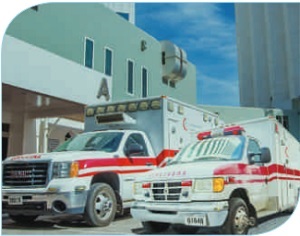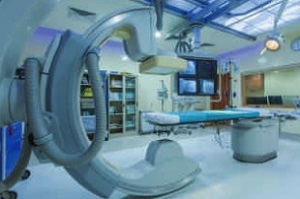Chest Pain


What is Chest Pain?
- Chest pain due to cardiac ischemia typically tends to be retrosternal or epigastric, tight and crushing in quality and may radiate to the arms, shoulders, neck or jaw.
- Chest pain may be associated with sweating, nausea, vomiting, dyspnea, fatigue and/or palpitations
- Shortness of breath may be the main symptom of cardiac ischemia, associated with angina pain, or a symptom of heart failure.
- Atypical presentations are common (especially in women, older menand people with diabetes)
- Examination: Many patients will have entirely normal examinations findings. However, a thorough cardiovascular examination is essential.

What are the Common causes of Chest pain?
Chest pain can be cardiac as well as non-cardiac too. The main causes of chest pan include:
- Angina, acute coronary syndrome (ACS) (including myocardial infarction)
- Acute pericarditis
- Pneumonia, Pulmonary embolus or Pneumothorax
- Gastro- esophageal reflux or esophageal spasm
- Peptic ulcer disease
- Gallstones and/or Cholecystitis
- Acute pancreatitis
- Chest wall pain, e.g. Tietze’s syndrome, trauma, shingles, rib secondaries or osteoporosis
- Aortic dissection
- Anxiety or depression
What are the investigations needed for Chest pain?
Depending on the clinical state of the patient and any suspicion of myocardial infarction, the patient may require immediate transfer to hospital before any investigations are performed.
Investigations may be required to exclude non-cardiac caused of chest pain, e.g. chest X-ray (pneumonia), abdominal ultrasound (gallstones) and serum amylase (acute pancreatitis)
Initial blood investigations include cardiac enzymes, fasting lipids, fasting glucose and full blood count (to exclude anemia and high white cell count may suggest pneumonia)

Resting ECG – a resting ECG is normal in over 90% of patients with recent symptoms of angina
Chest X-ray – this may be useful in evaluating the presence of heart failure or an alternative diagnosis, e.g. aortic aneurysm, pneumonia, rib fractures, rib secondaries or osteoporosis
Further investigations may include echocardiogram, coronary angiography, V/Q scan or pulmonary angiography (pulmonary embolus), CT aortography (aortic dissection) or upper gastrointestinal endoscopy (gastro- esophageal reflux disease or peptic ulcer)
What does NMC Royal Hospital Sharjah Chest Pain Clinic do?

For those patients not requiring immediate hospital admission, the chest pain clinics enable rapid confirmations of the diagnosis, initiation of treatment and where considered appropriate, further investigation and intervention.
Our Chest pain clinic encouraged, that prompt assessment and management actually reduces cardiac morbidity and mortality.
Patients should understand that further assessment may lead to a recommendation for more invasive treatment.
For any Chest pain or Chest discomfort, visit our Emergency department or contact us on 06-5619999

- Quick Response Time
- International expertise
- Multidisciplinary Team Approach
- Advanced technology
- International Standards for diagnostics and treatment



